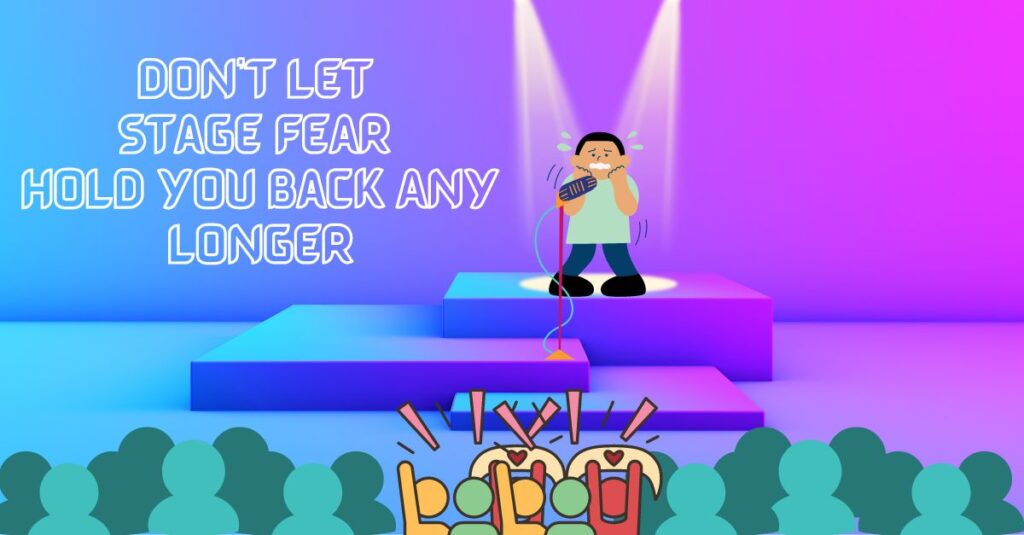Is Stage Fear Giving You Anxiety? Here’s How You Can Overcome This At A Young Age

Have you ever seen a child on stage who is so petrified that they can barely move? Or, have you felt it yourself? This is a common phenomenon known as stage fear.
Fear in life is inevitable. None of us are free from fear, but we may experience it in different forms depending on our personalities and the place we have in society. But what if your outlet has turned into one of your biggest fears? This can happen to anyone, but the good news is that stage fear can be fixed.
Learning to overcome stage fear doesn’t happen overnight. It’s something that should be a gradual process, where practicing courage and trying new things slowly builds up your confidence.
What is Stage Fear?
Whether you’re an experienced performer or just starting out, stage fear is a very real phenomenon that can have a serious impact on your ability to give a great performance. While it’s normal to feel some nerves before going on stage, for some people, the anxiety can be so crippling that it prevents them from being able to perform at their best. If you’re struggling with stage fear, don’t despair – there are plenty of things you can do to overcome this anxiety and give the best performance of your life.
One of the first things you need to understand is what exactly stage fear is. Contrary to popular belief, it’s not just about being nervous about being on stage in front of an audience. stage fear is actually a type of performance anxiety that can affect anyone who is performing in front of an audience, no matter how experienced they are. The key symptom of stage fear is intense fear or panic that comes on just before or during a performance. This can manifest itself in physical symptoms such as sweating, shaking, trembling, difficulty breathing, and even a racing heart. For some people, the anxiety is so severe that it prevents them from even starting their performance.
What Causes Stage Fear?
Stage fear or anxiety is a natural symptom of some people, in the form of a knot in the stomach as obvious as butterflies in your stomach. While it may seem like something that should be outgrown, stage fear can actually persist into adulthood. So what causes this fear of performing in front of others?
There are a number of potential causes of stage fear. One is a lack of confidence. If you do not believe in your ability to perform, you may be more likely to experience stage fright. Another possibility is a fear of failure. If you are worried about not meeting others’ expectations, you might be more likely to freeze up on stage.
There are also some physical causes of stage fear. One is a fight-or-flight response. When you feel threatened, your bodies release adrenaline, which can lead to a racing heart and shaky hands. This response is meant to help us escape from danger, but it can also make it difficult to focus and perform.
Symptoms of Stage Fear
Stage fear, or performance anxiety, is a type of anxiety that can occur in any situation where you are required to perform in front of an audience. It can cause a range of symptoms, from mild butterflies in your stomach to full-blown panic attacks. While it is perfectly normal to feel some nerves before a big performance, if you find that your stage fear is impacting your ability to perform, it may be time to seek help.
There are a number of different symptoms of stage fear, and they can vary from person to person. Some common symptoms include:
• Sweating
• Rapid heartbeat
• Shortness of breath
• Shaking or trembling
• Nausea or stomach pain
• Dizziness or lightheadedness
• Feeling like you are going to faint or pass out
• Fear of losing control or making a fool of yourself
If you experience any of these symptoms, it is important to remember that you are not alone. Many people suffer from stage fear, and there are ways to overcome it. With the right help and support, you can learn to control your anxiety and give a great performance.
Social Layers of Anxiousness
Anxiety is a normal emotion that everyone experiences at some point in their life. However, for some people, anxiety can be a chronic and debilitating condition that interferes with daily life. Among the many different types of anxiety disorders, stage fear is one of the most common, especially among young people.
stage fear is the fear of public speaking or performing in front of an audience. It can cause physical symptoms like shaking, sweating, and a racing heart. For some people, the fear is so overwhelming that it prevents them from ever getting on stage.
Fortunately, there are things that you can do to overcome your stage fear and anxiety. Here are some tips:
1. Understand your anxiety. The first step is to understand what is causing your anxiety. If you can identify your triggers, you can then start to work on addressing them.
2. Breathe deeply. When you’re feeling anxious, your breathing becomes shallow and rapid. This can make your symptoms worse. Taking some deep breaths will help you relax and calm down.
3. Practice visualization. Visualizing yourself succeeding on stage can help you feel more confident and ease your anxiety. See yourself doing well and imagine the positive reaction from the audience.
Dangers of Living with stage fear
Having stage fear can be extremely debilitating and prevent you from living your life to the fullest. This type of anxiety can make it difficult to participate in school activities, give speeches, or even perform in front of others. If you’re someone who experiences stage fear, it’s important to understand the dangers that come along with this condition.
One of the dangers of living with stage fear is that you may miss out on some important opportunities in life. For example, if you’re too afraid to give a speech in front of your classmates, you may not get the chance to share your ideas or show what you’re capable of. Additionally, if you’re avoiding performing in front of others, you could be missing out on valuable practice and feedback that could help you improve your skills.
Another danger of having stage fear is that it can negatively impact your mental health. Living with this type of anxiety can be very stressful and can lead to feelings of low self-esteem and depression. Additionally, stage fear can make it difficult to concentrate and focus on tasks, which can impact your academic performance.
Anxiety Management Techniques
If you’re someone who suffers from stage fear or anxiety, you know how debilitating it can be. Whether it’s a big presentation at work, a public speaking engagement, or even just talking to a group of people, the fear of being in the spotlight can be enough to make anyone break out in a cold sweat.
But there are some things you can do to manage your anxiety and make it more manageable. Here are a few tips:
1. Practice Deep Breathing: This is one of the most effective ways to calm your nervous system and reduce stress. When you’re feeling anxious, take a few deep belly breaths and focus on exhaling slowly. This will help your body relax and ease the tension you’re feeling.
2. Avoid Caffeine: Caffeine is a stimulant and can increase anxiety levels. If you’re prone to anxiety, limit your caffeine intake or avoid it altogether.
3. Get Some Exercise: Exercise is a great way to release endorphins, which have mood-boosting properties. A quick walk around the block or a few minutes on the elliptical can help reduce stress and clear your head.
4. Talk To The Teacher: A good teacher will be able to give you some tips and tricks for dealing with stage fear. They may also be able to adjust the curriculum or assignments to help you feel more comfortable.
5. Find A Role Model: If you can see someone else who has successfully overcome their stage fear, it may help you to feel more confident. Watch videos of your favorite performers or speakers, or read their interviews.
6. Remind That It’s Okay To Make Mistakes: Everyone does it. What’s important is that keep going and try your best.
7. Practice At Home: Practice in front of smaller groups or even at home in front of a mirror until you feel more comfortable performing.
With a little effort and support, you can overcome your stage fear and shine.
Stage fear is a very real phenomenon that can affect people of all ages. However, it is something that can be overcome with a little bit of effort and perseverance. If you are somebody who suffers from stage fear, we hope that this article has given you some tips and tricks on how to overcome it. Remember, the first step is always acknowledging that you have a problem and then working on finding a solution that works for you. We wish you all the best in your journey to conquering your stage fear!


